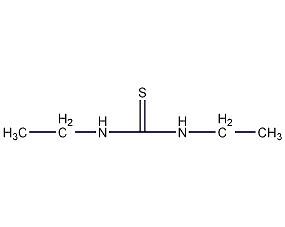
Structural formula
| Business number | 02RW |
|---|---|
| Molecular formula | C5H12N2S |
| Molecular weight | 132.23 |
| label |
1,3-diethyl-2-thiourea, N,N’-diethylthiourea, accelerator DETU, 1,3-diethyl-2-thiourea, N, N’-diethyl thiourea, Thiourea accelerator, Organic corrosion inhibitor |
Numbering system
CAS number:105-55-5
MDL number:MFCD00004925
EINECS number:203-308-5
RTECS number:YS9800000
BRN number:773905
PubChem number:24893318
Physical property data
1. Properties: white to light yellow flaky crystals.
2. Relative density (g/mL, 25℃): 1.100
3. Melting point (ºC): 74~ 76
4. Refractive index: 1.4000
5. Flash point (ºC): 186
6. Solubility: easily soluble in ethanol , acetone, soluble in water, insoluble in gasoline.
Toxicological data
1, acute toxicity: oral administration to ratsLD50:316mg/kg; Mouse orally LCLo:62 mg/kg; span> Mouse peritoneal cavityLC50:500mg/kg; 2. Chronic toxicity/Carcinogenicity: Rat oral TDLo: 11mg/kg/2Y-C; span> 3. Mutagenicity: in mammalian somatic cells Medium mutation test: mouse lymphocytes, 1500mg/L; 550mg/L;
Ecological data
General remarks
Water hazard level 1 (German regulations) (self-assessment via list) This substance is slightly hazardous to water.
Do not allow undiluted or large amounts of product to come into contact with groundwater, waterways or sewage systems.
Do not discharge materials into the surrounding environment without government permission.
Molecular structure data
1. Molar refractive index: 39.69
2. Molar volume (cm3/mol): 133.6
3. Isotonic specific volume (90.2K ): 333.5
4. Surface tension (dyne/cm): 38.7
5. Dielectric constant:
6. Dipole moment (10-24cm3):
7. Polarizability: 15.73
Compute chemical data
1. Reference value for hydrophobic parameter calculation (XlogP): None
2. Number of hydrogen bond donors: 2
3. Number of hydrogen bond acceptors: 1
4. Number of rotatable chemical bonds: 2
5. Number of tautomers: 2
6. Topological molecule polar surface area 56.2
7. Number of heavy atoms: 8
8. Surface charge: 0
9. Complexity: 64.8
10. Number of isotope atoms: 0
11. Determine the number of atomic stereocenters: 0
12. Uncertain number of atomic stereocenters: 0
13. Determine the number of chemical bond stereocenters: 0
14. Number of uncertain chemical bond stereocenters: 0
15. Number of covalent bond units: 1
Properties and stability
Avoid contact with oxidants. Easily soluble in ethanol and acetone, soluble in water, and insoluble in gasoline. Hygroscopic.
Storage method
1. Store in a cool, ventilated warehouse. Keep away from fire and heat sources. should be kept away from oxidizer, do not store together.
2. Equip with corresponding varieties and quantities of fire-fighting equipment. The storage area should be equipped with emergency release equipment and suitable containment materials.
Synthesis method
1. Obtained from the reaction of ethylamine and carbon disulfide. First, add ethylamine to the reaction kettle, heat to 35-40°C while stirring, then add carbon disulfide dropwise while stirring, and complete the dropwise addition within 40-45 minutes. Then the temperature was raised to 95°C and the reaction was maintained for 3 hours. Then the temperature is lowered to 50°C and the material is discharged. The product is cooled, filtered, washed and dried to obtain the finished product. The product content is 92% and the yield is 80%.

2.Ethylamine aqueous solution reacts with carbon disulfide at 20~30℃ to generate ethylamine salt of ethyldithiocarbamate. The substance decomposes at 96-100°C and releases hydrogen sulfide gas, and then undergoes separation, washing, crystallization, crushing and drying to obtain the finished product.
Purpose
1. It can be used as thiourea accelerator. This product is also an accelerator for butyl rubber and a vulcanization activator for EPDM rubber.
2. Chloroprene vulcanized rubber with good properties such as tensile strength, hardness, and compression permanent deformation can be produced. Compared with NA-22 (ethylene thiourea), this product scorches and vulcanizes faster, but has better vulcanization flatness. This product is easy to disperse and does not bloom. When the dosage is large, high-temperature and high-speed vulcanization can be performed, and it is especially suitable for continuous vulcanization of extruded products. This product is also an accelerator for butyl rubber and a vulcanization activator for EPDM rubber. It can activate thiazole and sulfenamide accelerators in natural and styrene-butadiene rubber. It has antioxidant effects on natural rubber, chloroprene rubber, nitrile rubber and styrene-butadiene rubber. Generally used to manufacture industrial rubber products, special wires, sponge products, etc. The general dosage in chloroprene rubber is 0.25 to 1 part. The dosage in natural rubber and styrene-butadiene rubber is 0.3 to 1.5 parts, and is combined with 0.3 to 1.5 parts of accelerator DM. This product is also used to prepare corrosion inhibitor Rodine 31A.
3.Highly efficient corrosion inhibitor, it can be added to acid solution alone as a corrosion inhibitor for ferrous metals, or it can be combined with sulfamic acid and citric acid. Made into solid cleaning agent. Also used as copper dissolution accelerator.
4.Used as an accelerator for chloroprene rubber and styrene-butadiene rubber adhesives. The vulcanization and scorching are faster than accelerator NA-22. When the dosage is large, it can perform high-temperature rapid vulcanization. It is especially suitable for continuous vulcanization of extruded products. The products have small compression deformation and good aging resistance. Also used as vulcanization activator for EPDM rubber. It has antioxidant effects on natural rubber, nitrile rubber, styrene-butadiene rubber and chloroprene rubber. It is easy to disperse during operation and does not spray frost. It is generally used in industrial products, sponge products and special wires. Also used as raw material for preparing corrosion inhibitors.
Small shape and good aging resistance. Also used as vulcanization activator for EPDM rubber. It has antioxidant effects on natural rubber, nitrile rubber, styrene-butadiene rubber and chloroprene rubber. It is easy to disperse during operation and does not spray frost. It is generally used in industrial products, sponge products and special wires. Also used as raw material for preparing corrosion inhibitors.

 微信扫一扫打赏
微信扫一扫打赏

